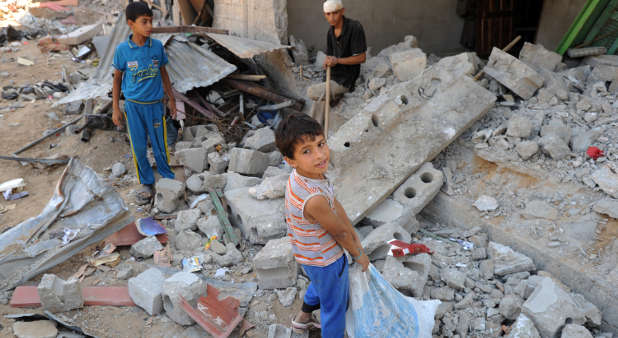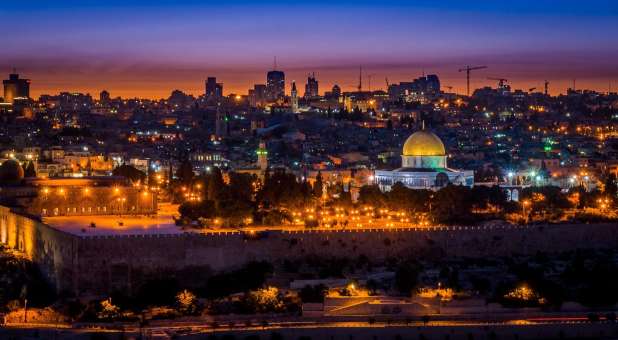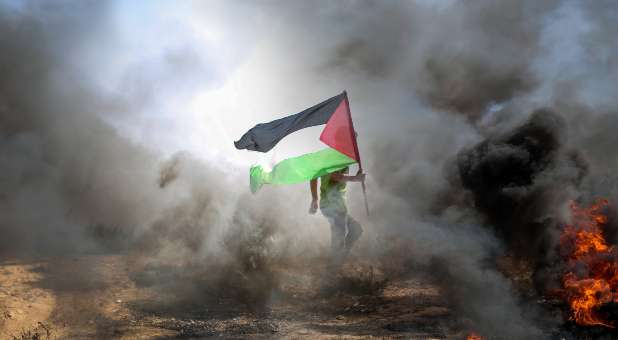Israel has endured terrorism for decades—even predating the state’s establishment. But ever since 9/11 and subsequent major terrorist attacks worldwide, more countries are starting to ask the same question: What motivates terrorists? It’s a question that is as pertinent as ever for Israelis amid the current months-long Palestinian terror wave.
The immediate or most common answer on the question of motivation is the one that many politicians like to give: Terrorists are poor, ignorant individuals who don’t have anything to live for; if they were given an alternative, some money, and prospects for a better life, they would choose a different path.
“We fight against poverty, because hope is an answer to terror,” said former U.S. president George W. Bush in the aftermath of 9/11. “I fully believe that the root cause of terrorism does come from situations where there is poverty … where people see no hope in their lives,” wrote former U.S. secretary of state Colin Powell in a 2002 State Department memorandum. “We have a huge common issue in dealing with the issue of poverty, which in many cases is the root cause of terrorism,” said current Secretary of State John Kerry in a meeting with the Vatican in 2014.
When it comes to the Israeli-Palestinian conflict, many commentators have made similar argument. In a 2015 column published by The Jerusalem Post, economics researcher Dr. Sami Miaari wrote, “Reducing poverty and unemployment, improving the education system and infrastructure, and improving jurisdiction lands in Arab towns could easily change the situation from one of a security risk to one of a security advantage.”
The narrative is believable enough. But according to a series of studies, the premise is wrong.
Instead, the studies reveal, terrorists tend to be better educated and more financially stable than the casual observer would expect.
“We looked both at the micro level, the individual, and at the macro level, the state of the nation from which the terrorist originates. In both cases, we find the opposite to be true. People do not go into terrorism because of poverty,” said Prof. Claude Berrebi, a public policy scholar at Hebrew University of Jerusalem, whose 2007 policy paper— “Peace Economics, Peace Science and Public Policy”—presents a statistical analysis of the determinants of participation in terrorist activities by members of the Hamas and Islamic Jihad organizations between the late 1980s and May 2002.
Berrebi found that among the 285 Palestinian terrorists analyzed in his study, 16 percent—compared to 31 percent of Palestinians in general—were characterized as “poor.” Second, among the 208 terrorists for whom Berrebi had access to information about their education, 96 percent (200) had at least a high school education and 65 percent (135) had some kind of higher education, compared to 51 percent and 15 percent, respectively, of members of the general Palestinian population with the same age, sex, and religion.
What explains these numbers? Berrebi told JNS.org that most terrorists view their work as violent political activity, not crime. While there is a clear link between crime and poverty, the same isn’t necessarily true about violent political activity and poverty.
“Political activity is mainly the work of better-educated individuals and people of a higher socioeconomic status. If you start to think of terrorism as a political move, it makes more sense,” Berrebi said.
David Sterman, a senior program associate at the Washington, D.C.-based New America think tank, sophisticated terrorist organizations look for members with the skills they need to succeed at carrying out terror attacks—engineers, for example.
“Terrorist organizations want the most experienced, smartest, most easily travel-able individuals to conduct operations,” Sterman told JNS.org. “If you have a choice between people with middle- or upper-class backgrounds versus from poorer backgrounds, you will pick from the more well-off.”
In terms of Palestinian terrorism, New America examined 330 Islamic Jihad and Fatah terrorists and found there was no economic pattern among them; the terrorists came from all classes of society. But the bulk of the terrorists did seem to be from middle-class families—about as educated as the average American, said Sterman.
Research shows that improving a country’s gross domestic product (GDP) can potentially increase terrorism rather than reduce it—up to a point. Berrebi pointed to a 2016 study by Walter Enders, Gary A. Hoover, and Todd Sandler that was published in the Journal of Conflict Resolution, showing that domestic and transnational terrorist attacks are each more concentrated in middle-income countries. Terrorists from poorer countries possess little means for supporting terrorism, while richer countries have the resources to crush domestic terrorism; therefore, terror attacks reach their peak at an intermediate level of GDP per capita, the study found.
“When a country is very poor … people are more concerned about whether they will have enough to eat,” Berrebi said. “Once their economic condition improves, they are freed up to start thinking of other issues that bother them, like their political status. It is only once a country is well enough off that the level [of terrorism] will actually be reduced again.”
In fact, the second Palestinian intifada (violent uprising) started at the height of Palestinian economic wellness, and just after a failed round of Israeli-Palestinian peace talks at Camp David.
“The negotiations in 2000 failed at a time when the Palestinian economy was at its best. When it finally dwindled off between 2005 and 2006, Palestinian poverty was at its highest level ever,” said Berrebi. The specific end date of the second intifada is disputed, but many consider the end to be the February 2005 Sharm el-Sheikh Summit.
Berrebi said that if one applies the Enders/Hoover/Sandler theory to the Palestinians, in order to substantively reduce Palestinian terrorism, the Palestinians’ GDP per capita would need to improve more than tenfold.
While that isn’t a realistic possibility for the Palestinian GDP in the short run, the link between income and terrorism shouldn’t be wholly dismissed, said Berrebi, whose most recent research found that in one out of four cases, worsening economic conditions meant better-educated and more experienced terrorists.
“You get lesser-quality terrorists if economic conditions are better. The better terrorists are no longer available—they’re working,” Berrebi said, noting that his research team also found that worsening economic conditions increase the rates of both suicide terrorism and religiously motivated terrorism.
Under such logic, the relatively unsophisticated stabbing attacks of the current Palestinian terror wave would point to better economic conditions than Palestinians experienced during the second intifada, which saw more sophisticated attacks such as bus bombings. Yet the current spate of attacks by so-called “lone wolf” terrorists, rather than attacks orchestrated by organizations like Hamas, complicates the process of determining what motivates the terrorism.
The opinions of this author do not necessarily reflect those of Charisma Media. For the original article, visit jns.org.
See an error in this article?
To contact us or to submit an article























